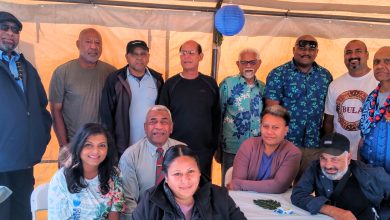MORE THAN WORDS: Lack of Translation Services and Trust Leave Out Voices in Stockton


By Victoria Franco
Bay City News
In February, Griselda Juarez left her work early at Premier Finishing, a company that specializes in painting auto parts for various car makers, and rushed through making dinner for her family so she could attend a quarterly neighborhood meeting with the Stockton Police Department.
Juarez, 50, a resident of Weston Ranch in Stockton, faithfully attends every meeting in hopes of receiving answers about adding more grocery stores to the area and discussing crime and safety issues in her neighborhood. But most days, she goes back home without having voiced her concerns.
Juarez is not a native English speaker, and often there are no translation services available to understand what information is being given and to allow her to ask questions.
“In this last meeting we had with the police, the officer said there wasn’t anyone to interpret, anyone to help us, so I didn’t get anything out of it,” Juarez said in Spanish.
“I felt like I went to waste my time … I went to sit and warm up a chair, as people would say,” she said.
About 45 percent of Stockton’s residents are Latino, with over 40 percent of people in San Joaquin County speaking a language other than English at home, according to the U.S. Census. Many of those who only speak Spanish, like Juarez, are frustrated that language barriers get in the way of public safety information.
Now they are asking city officials to offer solutions and create meaningful connections with Spanish speakers in the area.
The issue goes beyond the meetings. Residents point to the lack of communication and outreach in their language as one of the biggest hurdles to developing trust between the community and the police. That limits the availability of public safety information for an already vulnerable population and restricts their ability to better the community and gain more representation.
A killer on the loose, a gap in communication
The potentially dangerous consequences of language barriers were highlighted last October when Stockton officials held a town hall meeting to discuss the threat of serial killings that had been taking place in the city since April 2021. At the time, seven people had been killed or shot. Five of them were Hispanic men.
During the town hall, city officials told community members about the killings and gave tips on how to stay safe, especially during early morning hours. However, several Spanish speakers in attendance left the meeting disappointed and frustrated because they were left out of the conversation after translating services failed.
This was particularly worrisome for agricultural workers in attendance who were among the most vulnerable because they leave for work in the dark, early mornings, often alone.
“Remember our folks who work in the field, what time do they get up?” said Luz Sauceda, health educator for El Concilio, a non-profit organization that offers a multitude of services primarily to the Hispanic population of the Central Valley.
Mayor Kevin Lincoln said following the meeting that another town hall was held specifically for the Spanish-speaking community, and he invited other community stakeholders as well.
“I hear you; your city hears you,” said Lincoln in response to people feeling left out of the meeting. “We’re here to serve you and to do the best we can to meet you where you’re at, at the point of your needs.”
Translation challenges
Stockton police say that when they host a meeting or town hall, they rely on members of the Chief’s Community Advisory Board, a group created in 2012 to improve communication, trust, and collaboration between Stockton residents and the police, to assist with translations while at events.
But at the Feb. 14 quarterly neighborhood meeting there was no one available to help with translations.
Juarez and Ernestina Barrios, another Stockton resident, said that Zoyla Moreno, a neighborhood watch captain for Weston Ranch, has tried to translate for them.
However, it is often hard to follow and ends up creating a more stressful environment.
Their complaints focused on the quality of the translation and the absence of earphones with which to listen to it. Barrios said that at one meeting in particular, an English speaker had said they couldn’t hear the meeting or pay attention because of the talking and translation happening next to them, which made Barrios feel awkward.
“I think that’s the problem,” said Barrios. “Because the woman is translating but she’s not going to be next to me, right? Instead, she has to talk sitting up, not telling me in my ear. So then, I think, the people who are next to me are interrupted in hearing as well.”
Although Moreno stepped in to translate for the women, she is not a certified translator, nor does she have the qualifications to translate at meetings. Barrios said it was difficult for Moreno to interpret during the meeting because she had to pay attention to what was being said.
Both women said they would like to see the Stockton Police Department bring back earphones that were previously used for Spanish speakers to listen to a translation of the meeting. Joseph Silva, a spokesperson with the Stockton Police Department, said in March that the department had recently purchased earphones that would be used at upcoming meetings.
In the neighboring city of Lodi, earphone transmitters and receivers were useful in overcoming language issues during meetings and hearings.
Rosa Trevizo, a State of California Certified Court Spanish Interpreter, attends every City Council meeting to ensure that Spanish speakers can understand the meeting and she helps them speak during public comment.
She said she has been a city translator for eight years and goes to the meetings whether or not people request translations service in advance.
In a special City Council meeting in March, Trevizo gave more than 20 people headphone receivers where they were able to hear her translate the more than three-hour meeting about who would be selected to fill a vacancy in District 4 on Lodi’s East Side — after a previous council member was accused of voter fraud.
Hispanic community members who were angry about the possible election fraud and who wanted to have a voice in a successor were able to address the council with the help of Trevizo.
Stockton city officials say they are working on other services, including a citywide web page that would use Google translation services, as well as translation service through Amazon to give residents bilingual options when they access the website for information and updates. People will be able to choose the language they prefer.
Beyond translation
Despite web pages being translated, Barrios said she feels that more meetings need to be held in Spanish or with translation services.
“I don’t think it’s fair, I want the Latino voice to count, one’s voice as Hispanic,” she said.
Spanish speakers in the community said they believe another way to begin closing the gap between the language barriers is by city officials and police building a connection with the community to foster trust.
“Dialogue is good, forums are good, but you have to do work beforehand and develop the trust of the people,” said Luis Magana, an advocate for farmworker justice in the Central Valley.
Magana has seen the benefits of this approach before. He recalled a former police chief in San Joaquin County who didn’t speak any Spanish but was able to connect with the Hispanic community by showing he cared about the problems they faced.
For Magana, knowing that the authorities care enough to engage with the community, even if they don’t speak the language themselves, can open many doors.
“He spoke with us, and Spanish is not necessary when people can feel the trust and the willingness,” he said.
Magana said although some city officials do outreach in the community, he feels that it must occur consistently, and he would like to see more follow-through from city leaders.
Juarez said that although she and her Latino community continue to face obstacles with language barriers when it comes to public safety issues, she will continue to attend every police meeting because she wants it known that Spanish speakers matter and that they deserve representation — hoping that more visibility will lead to lasting change.
“I believe that even if we don’t understand, (we should go) so they see us and see that people are interested,” said Juarez. “Many people don’t go to the meetings, and I tell them we should go, even if we don’t understand, but have them see us, have them see that we’re interested, that we want to change our neighborhood and do new things.”
Copyright © 2023 Bay City News, Inc. All rights reserved. Republication, rebroadcast or redistribution without the express written consent of Bay City News, Inc. is prohibited. Bay City News is a 24/7 news service covering the greater Bay Area.



